Module 6 Old and New Grammar 课件(27张PPT)
文档属性
| 名称 | Module 6 Old and New Grammar 课件(27张PPT) |

|
|
| 格式 | zip | ||
| 文件大小 | 1.4MB | ||
| 资源类型 | 教案 | ||
| 版本资源 | 外研版 | ||
| 科目 | 英语 | ||
| 更新时间 | 2019-08-22 00:00:00 | ||
图片预览

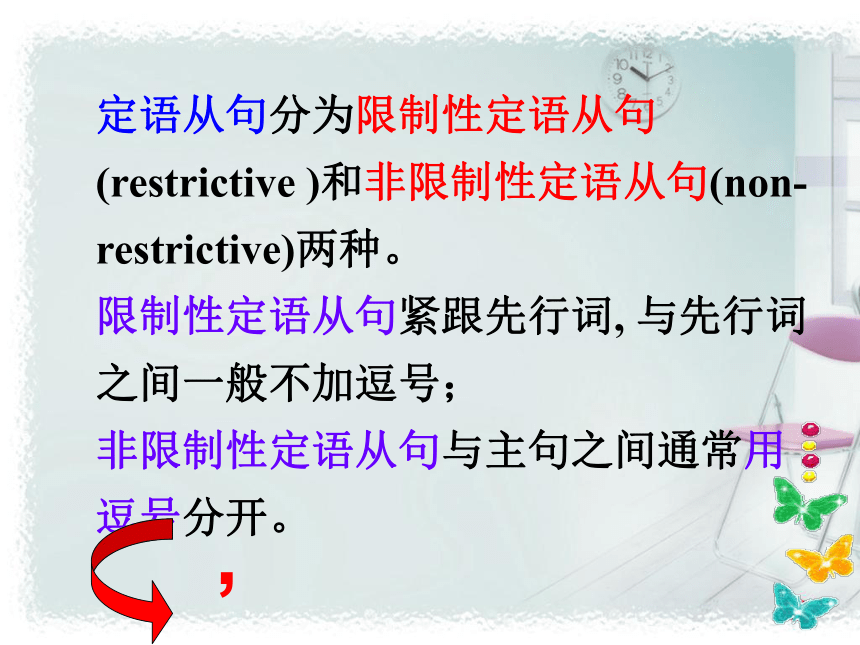
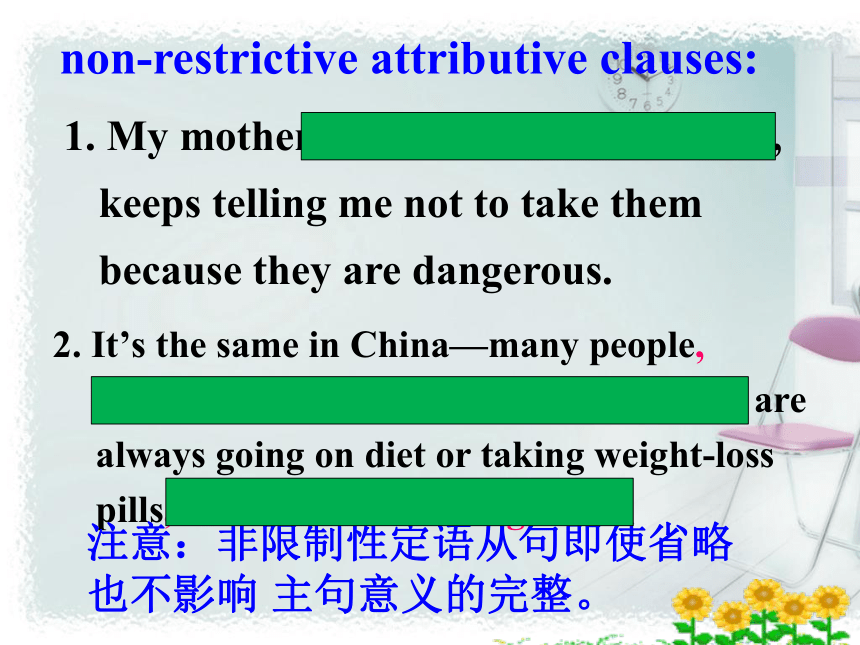
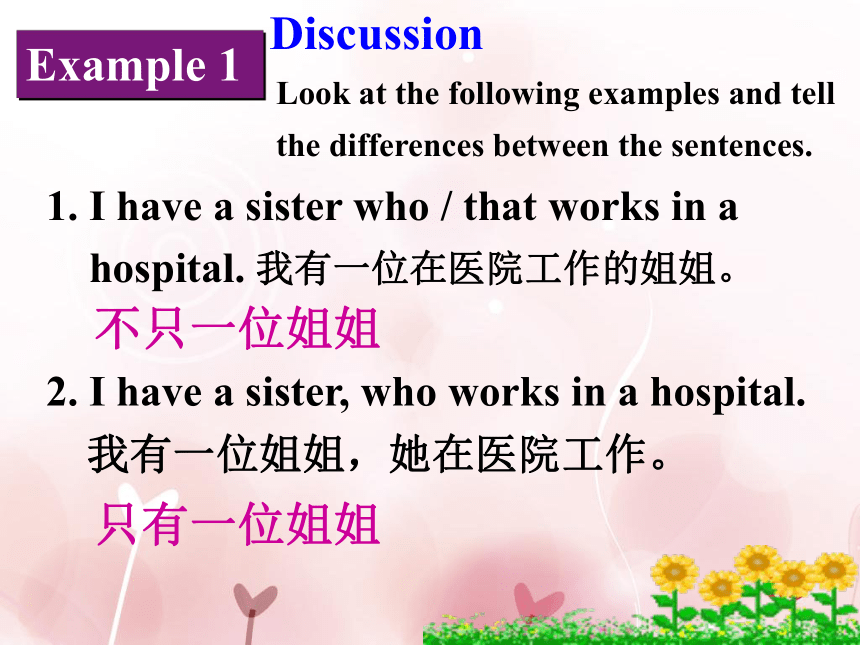

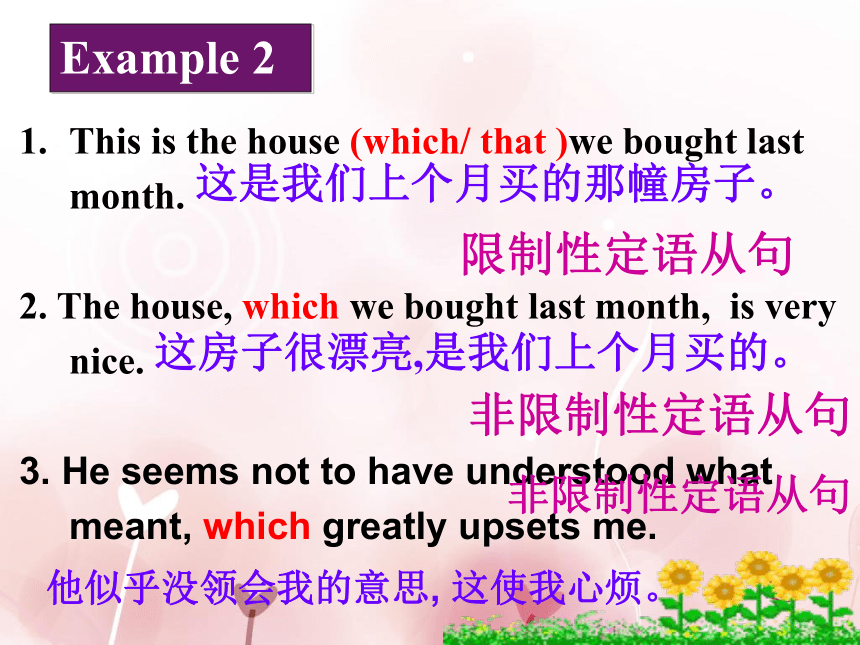

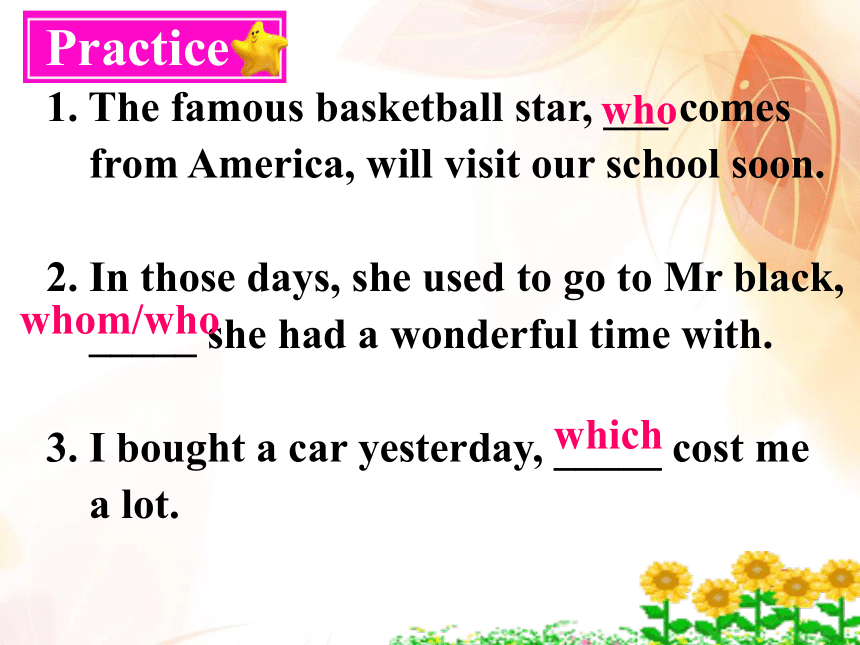
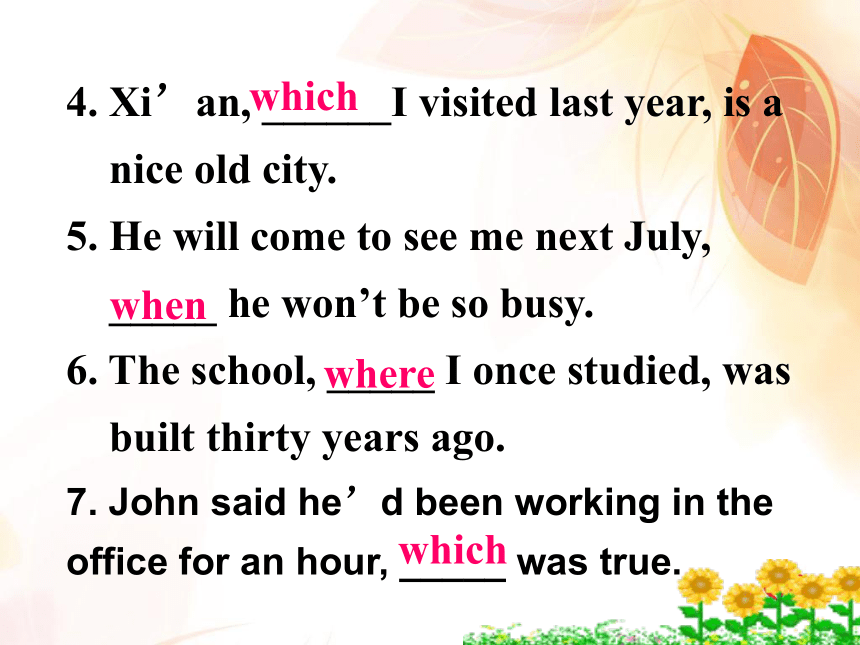
文档简介
课件27张PPT。Non-restrictive attributive clauses
非限制性定语从句 Grammar 定语从句分为限制性定语从句(restrictive )和非限制性定语从句(non-restrictive)两种。
限制性定语从句紧跟先行词, 与先行词之间一般不加逗号;
非限制性定语从句与主句之间通常用逗号分开。, 1. My mother, whom you met last year, keeps telling me not to take them because they are dangerous.non-restrictive attributive clauses:2. It’s the same in China—many people, some of whom are not overweight at all, are always going on diet or taking weight-loss pills, which are often dangerous.注意:非限制性定语从句即使省略也不影响 主句意义的完整。1. I have a sister who / that works in a hospital.
2. I have a sister, who works in a hospital. Example 1不只一位姐姐只有一位姐姐DiscussionLook at the following examples and tell the differences between the sentences. 我有一位在医院工作的姐姐。我有一位姐姐,她在医院工作。Conclusion 11. 限制性定语从句与先行词关系密切,是先行词_______的部分,如果去掉它,主句意思 不明确。
2. 非限制性定语从句是对先行词的补充或说明,去掉它__________的意思。不可缺少不会影响主句This is the house (which/ that )we bought last month.
2. The house, which we bought last month, is very nice.
3. He seems not to have understood what meant, which greatly upsets me.
Example 2限制性定语从句非限制性定语从句非限制性定语从句这是我们上个月买的那幢房子。这房子很漂亮,是我们上个月买的。他似乎没领会我的意思, 这使我心烦。Conclusion 21. 限制性定语从句中,关系代词作___ 时可以省略。
2. 非限制性定语从句既可修饰_____,又可修饰________,不可用_____引导且关系代词不可以_____。*关系副词when ,where, why 也可引导非限制性定语从句 先行词整个主句that省略宾语1. The famous basketball star, ___ comes from America, will visit our school soon.
2. In those days, she used to go to Mr black, _____ she had a wonderful time with.
3. I bought a car yesterday, _____ cost me a lot.which whom/whowho Practice4. Xi’an, ______I visited last year, is a nice old city.
5. He will come to see me next July, _____ he won’t be so busy.
6. The school, _____ I once studied, was built thirty years ago.
whichwherewhen7. John said he’d been working in the office for an hour, _____ was true.which非限制性定语从句考点归纳:考点一:as 和which引导非限制性定语从句都可指代整个主句内容。 1. As everyone knows,China is a country
with a long history. 正如每个人所知道的/众所周知,中国是一个历史悠久的国家。Example:2. He invited me to dinner, which made me very happy. 他请我吃饭, 这使我很高兴。1. Einstein, as is known, is a famous scientist.
2. As he reported, China has become an important country in the world.
3. Bamboo is hollow, which makes it very light.
4. My son now goes to the school, which I used to go to when I was a child.
5. He didn’t come to attend the meeting, as had been expected.Translate two sentences as , which 引导非限制定语 从句的
相同点和不同点 Conclusion相同点 as 和which在引导非限制性定语从句时, as和which都可代替_______ , 指代 ___ 所表达的整个意思,且在定语从句中都可以作___ 语和___语。整个主句主句主 宾 as和which引导非限制性定语从句的不同之处在于:
(1) as 引导的定语从句可置于______________________, 而which引导的定语从句_______________。
(2) as引导非限制性从句,常带有“ ____”的意思。 which无此意。句首,句中或句末不可放在句首正如Conclusion不同点 PracticeAlice received an invitation from her boss, _____ came as a surprise.
2. __ is expected, the England team won the football match.
Aswhichwhich3. It rained hard yesterday, _____ prevented me from going to the park.
4. __ we can see, the smoke came from the little dustbin.As考点二:
all
some Example:He has told us many stories, all of which are about the famous Long Match.
2. The students of Class 1, some of whom came from Japan, went camping yesterday.of + whom / which引导非限制性定语从句}Conclusion 在非限制性定语从句中,一些表达数量或定位的数词或代词如 all/ some/ one/ both/ neither/ none/ any/ either/ any 等可与 of 构成介词词组修饰限制先行词,此时先行词在其后的定语从句中作介词的宾语,关系代词不可用____。如先行词指人则用_____,如先行词指物则用_______引导从句。thatwhomwhich介词+whom/which
在定语从句中,whose +n.=the +n. +of which
=of which +the +n.
这个教室很快就会有人修,它的门坏了。
The classroom ,____________ is broken, will soon be repaired. =The classroom , _________________is broken, will soon be repaired.
=The classroom ,________________ is broken, will soon be repaired.whose doorthe door of whichof which the door考点三:非限制性定语从句和并列句的区别He has two sons , both of whom are doctors.
2. He has two sons, and both of them are doctors.
3. He has two sons; both of them are doctors.他有两个儿子,他们两个都是医生考点四:定语从句并列句并列句 相当于,andMany students in this school, some of which are not overweight, are going on diets.
2. There are 54 students in my class ,and ten of whom come from US.whomCorrection: them或去掉and3. Half a million pairs of shoes are produced by the workers here every year, 80% of whom are sold abroad.
4. I have many friends in this town, some of which are businessman.
5. I am doing different types of exercises, all of them are quite helpful to my health.whichwhich 或 all 前加andwhomPractice time1. ① He has two sons, __ are college students.
② He has two sons, and __ are college
students. A. both of which B. both of whom C. both of them D. both of itCB能力提升 2.① He still lives in the room __ window faces to the east.
② He still lives in the room, the window __ faces to the east.
③ He still lives in the room, __ is in the north of the city.
④ He still lives in the room, __ there is a beautiful table.
A. which B. whose
C. where D. of whichCADB3. ① ___ we all know, China is rich in
natural resources.
② ___ is well-known that China is rich in natural resources.
③ ___ is well-known, China is rich in natural resources.
AsItAs定语从句主语从句定语从句④________we all know is _____ China is rich in natural resources.
WhatWhich As It That Whatthat主语从句、表语从句4.① Is this museum ___ he visited last month?
② The teacher tells us that ___ cleans the blackboard is to be praised. A. that B. the one C. which D. the one whoBD先变为陈述句This museum is ____ he visited last month.1.如我们所知,吸烟有害健康
2.他们住在一个高楼里,楼前有棵大树
3.我们应该认真学习英语,英语在未来作用很大。As we know, smoking is harmful to our health.They live in a tall building, in front of which stands a big tree.We should learn English hard ,which will be useful in the future.TranslationCorrect mistakes Which you can see, those whom are playing the
football are from a middle school. This senior high
school where is quite famous is located in the
northeast of Mianyang. All the people and things
which I see are very lovely. The person to that I talk
is Mr. Cao of the school, whom students are usually admitted to the key university. Because of his position which the responsibility is very heavy, he can’t do such things that he is not sure about.whowhichthatwhomwhoseAswhereas_______________________________________
非限制性定语从句 Grammar 定语从句分为限制性定语从句(restrictive )和非限制性定语从句(non-restrictive)两种。
限制性定语从句紧跟先行词, 与先行词之间一般不加逗号;
非限制性定语从句与主句之间通常用逗号分开。, 1. My mother, whom you met last year, keeps telling me not to take them because they are dangerous.non-restrictive attributive clauses:2. It’s the same in China—many people, some of whom are not overweight at all, are always going on diet or taking weight-loss pills, which are often dangerous.注意:非限制性定语从句即使省略也不影响 主句意义的完整。1. I have a sister who / that works in a hospital.
2. I have a sister, who works in a hospital. Example 1不只一位姐姐只有一位姐姐DiscussionLook at the following examples and tell the differences between the sentences. 我有一位在医院工作的姐姐。我有一位姐姐,她在医院工作。Conclusion 11. 限制性定语从句与先行词关系密切,是先行词_______的部分,如果去掉它,主句意思 不明确。
2. 非限制性定语从句是对先行词的补充或说明,去掉它__________的意思。不可缺少不会影响主句This is the house (which/ that )we bought last month.
2. The house, which we bought last month, is very nice.
3. He seems not to have understood what meant, which greatly upsets me.
Example 2限制性定语从句非限制性定语从句非限制性定语从句这是我们上个月买的那幢房子。这房子很漂亮,是我们上个月买的。他似乎没领会我的意思, 这使我心烦。Conclusion 21. 限制性定语从句中,关系代词作___ 时可以省略。
2. 非限制性定语从句既可修饰_____,又可修饰________,不可用_____引导且关系代词不可以_____。*关系副词when ,where, why 也可引导非限制性定语从句 先行词整个主句that省略宾语1. The famous basketball star, ___ comes from America, will visit our school soon.
2. In those days, she used to go to Mr black, _____ she had a wonderful time with.
3. I bought a car yesterday, _____ cost me a lot.which whom/whowho Practice4. Xi’an, ______I visited last year, is a nice old city.
5. He will come to see me next July, _____ he won’t be so busy.
6. The school, _____ I once studied, was built thirty years ago.
whichwherewhen7. John said he’d been working in the office for an hour, _____ was true.which非限制性定语从句考点归纳:考点一:as 和which引导非限制性定语从句都可指代整个主句内容。 1. As everyone knows,China is a country
with a long history. 正如每个人所知道的/众所周知,中国是一个历史悠久的国家。Example:2. He invited me to dinner, which made me very happy. 他请我吃饭, 这使我很高兴。1. Einstein, as is known, is a famous scientist.
2. As he reported, China has become an important country in the world.
3. Bamboo is hollow, which makes it very light.
4. My son now goes to the school, which I used to go to when I was a child.
5. He didn’t come to attend the meeting, as had been expected.Translate two sentences as , which 引导非限制定语 从句的
相同点和不同点 Conclusion相同点 as 和which在引导非限制性定语从句时, as和which都可代替_______ , 指代 ___ 所表达的整个意思,且在定语从句中都可以作___ 语和___语。整个主句主句主 宾 as和which引导非限制性定语从句的不同之处在于:
(1) as 引导的定语从句可置于______________________, 而which引导的定语从句_______________。
(2) as引导非限制性从句,常带有“ ____”的意思。 which无此意。句首,句中或句末不可放在句首正如Conclusion不同点 PracticeAlice received an invitation from her boss, _____ came as a surprise.
2. __ is expected, the England team won the football match.
Aswhichwhich3. It rained hard yesterday, _____ prevented me from going to the park.
4. __ we can see, the smoke came from the little dustbin.As考点二:
all
some Example:He has told us many stories, all of which are about the famous Long Match.
2. The students of Class 1, some of whom came from Japan, went camping yesterday.of + whom / which引导非限制性定语从句}Conclusion 在非限制性定语从句中,一些表达数量或定位的数词或代词如 all/ some/ one/ both/ neither/ none/ any/ either/ any 等可与 of 构成介词词组修饰限制先行词,此时先行词在其后的定语从句中作介词的宾语,关系代词不可用____。如先行词指人则用_____,如先行词指物则用_______引导从句。thatwhomwhich介词+whom/which
在定语从句中,whose +n.=the +n. +of which
=of which +the +n.
这个教室很快就会有人修,它的门坏了。
The classroom ,____________ is broken, will soon be repaired. =The classroom , _________________is broken, will soon be repaired.
=The classroom ,________________ is broken, will soon be repaired.whose doorthe door of whichof which the door考点三:非限制性定语从句和并列句的区别He has two sons , both of whom are doctors.
2. He has two sons, and both of them are doctors.
3. He has two sons; both of them are doctors.他有两个儿子,他们两个都是医生考点四:定语从句并列句并列句 相当于,andMany students in this school, some of which are not overweight, are going on diets.
2. There are 54 students in my class ,and ten of whom come from US.whomCorrection: them或去掉and3. Half a million pairs of shoes are produced by the workers here every year, 80% of whom are sold abroad.
4. I have many friends in this town, some of which are businessman.
5. I am doing different types of exercises, all of them are quite helpful to my health.whichwhich 或 all 前加andwhomPractice time1. ① He has two sons, __ are college students.
② He has two sons, and __ are college
students. A. both of which B. both of whom C. both of them D. both of itCB能力提升 2.① He still lives in the room __ window faces to the east.
② He still lives in the room, the window __ faces to the east.
③ He still lives in the room, __ is in the north of the city.
④ He still lives in the room, __ there is a beautiful table.
A. which B. whose
C. where D. of whichCADB3. ① ___ we all know, China is rich in
natural resources.
② ___ is well-known that China is rich in natural resources.
③ ___ is well-known, China is rich in natural resources.
AsItAs定语从句主语从句定语从句④________we all know is _____ China is rich in natural resources.
WhatWhich As It That Whatthat主语从句、表语从句4.① Is this museum ___ he visited last month?
② The teacher tells us that ___ cleans the blackboard is to be praised. A. that B. the one C. which D. the one whoBD先变为陈述句This museum is ____ he visited last month.1.如我们所知,吸烟有害健康
2.他们住在一个高楼里,楼前有棵大树
3.我们应该认真学习英语,英语在未来作用很大。As we know, smoking is harmful to our health.They live in a tall building, in front of which stands a big tree.We should learn English hard ,which will be useful in the future.TranslationCorrect mistakes Which you can see, those whom are playing the
football are from a middle school. This senior high
school where is quite famous is located in the
northeast of Mianyang. All the people and things
which I see are very lovely. The person to that I talk
is Mr. Cao of the school, whom students are usually admitted to the key university. Because of his position which the responsibility is very heavy, he can’t do such things that he is not sure about.whowhichthatwhomwhoseAswhereas_______________________________________
